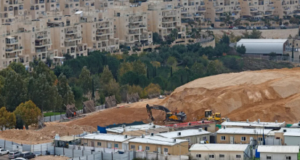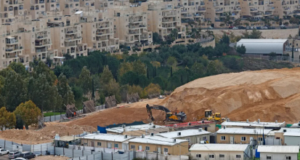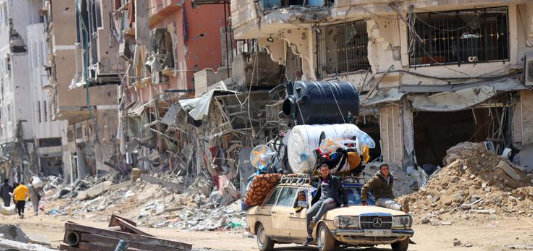URL: Israel-new-settlement-bethlehem-strategy-fragment-palestinian-territories
Meta Description: Muhannad Ayyash criticizes Israel’s approval of a new settlement in Bethlehem, calling it part of a broader strategy to fragment Palestinian territories and prevent the creation of a Palestinian state.
Israel’s New Settlement in Bethlehem Criticized as Strategy to Fragment Palestinian Territories
The recent approval of a new Israeli settlement in Bethlehem, located in the occupied West Bank, has drawn sharp criticism from Palestinian policy analysts. Muhannad Ayyash, a policy analyst with the Palestinian think tank Al Shabaka, has condemned the move as part of a broader Israeli strategy to fragment Palestinian communities and undermine the possibility of a future Palestinian state.
New Settlement Approval: The new settlement plan, sanctioned by Israel’s far-right Finance Minister Bezalel Smotrich, is viewed as a provocative step that will further entrench Israeli presence in the West Bank. The settlement is expected to disrupt Palestinian communities and exacerbate existing tensions in the region.
Ayyash’s Critique: In an interview with Al Jazeera, conducted from Halifax, Canada, Ayyash described the settlement as a strategic maneuver by Israel to isolate key Palestinian areas. “This is a part of the Israeli state’s strategy to fragment Palestinian communities from one another,” Ayyash stated. He elaborated that the plan aims to sever Bethlehem from other Palestinian territories and further isolate East Jerusalem from the rest of the West Bank.
Ayyash argues that the approval of new settlements is a deliberate attempt by Israel to create “facts on the ground” that will hinder the creation of a Palestinian state. “The strategic utility for Israel is always the same,” he said, emphasizing that the objective is to expand Israeli sovereignty over the entire region, from the river to the sea.

Broader Implications: The establishment of new settlements has been a contentious issue in the Israeli-Palestinian conflict, with international condemnation often following such actions. Critics argue that these settlements not only violate international law but also undermine efforts toward a peaceful resolution by altering the demographic and geographic landscape of the West Bank.
Historical Context: Settlement expansion in the West Bank has been a central issue in the Israeli-Palestinian conflict. The international community, including the United Nations, has consistently opposed settlement activities, viewing them as obstacles to the two-state solution. The expansion is seen as a way to consolidate Israeli control over key areas, making the establishment of a contiguous and viable Palestinian state more challenging.
International Reaction: The international community’s response to Israel’s settlement policies varies, with some countries and organizations calling for immediate halts to new construction and renewed efforts toward negotiations. The U.S. and European Union have periodically criticized settlement expansion but have yet to take decisive actions to curb the practice. The approval of the new settlement in Bethlehem is seen by many as a significant setback for peace efforts in the region. As Israel continues to implement its settlement expansion strategy, the prospects for a negotiated solution to the Israeli-Palestinian conflict remain uncertain. The international community’s role in addressing these issues will be crucial in shaping the future of the region and the potential for a lasting resolution.

Details on the Settlement Plan:
- Location and Size: Provide specific details about the location of the new settlement, its size, and the number of planned housing units.
- Current Status: Clarify whether construction has begun or if the settlement is still in the planning stages.
Historical Context of Israeli Settlements:
- Historical Overview: Offer a brief history of Israeli settlements in the West Bank, including key milestones and previous expansions.
- Legal Status: Summarize the international legal perspective on Israeli settlements, including relevant United Nations resolutions and international law.
Impact on Local Communities:
- Affected Palestinian Communities: Describe the specific Palestinian communities and neighborhoods that will be affected by the new settlement.
- Economic and Social Impact: Discuss how the settlement might impact local Palestinians economically, socially, and culturally.
Political Reactions:
- Israeli Government: Include reactions from various Israeli government officials and political parties, especially those supporting or opposing the settlement.
- Palestinian Authority: Present statements or responses from the Palestinian Authority or Palestinian leaders regarding the settlement.
- International Community: Highlight reactions from other countries and international organizations, including any official statements or actions taken in response.
Public Opinion:
- Israeli Public: Provide insights into Israeli public opinion on settlements, if available, including support or opposition to the new settlement.
- Palestinian Public: Include perspectives from Palestinian residents and organizations regarding the settlement and its impact.
- Previous Settlements and Disputes:
- Comparison: Compare the new settlement to previous settlement projects, including their impact on peace negotiations and local populations.
- Conflicts and Disputes: Detail any conflicts or disputes related to past settlements, including protests, legal battles, or clashes.
Negotiations and Peace Efforts:
- Current Negotiations: Discuss any ongoing peace negotiations or initiatives that may be affected by the new settlement.
- Historical Peace Efforts: Provide context on past peace efforts and how settlement expansion has influenced these efforts.
Legal and Human Rights Perspectives:
- International Law: Summarize key points of international law related to settlements, including arguments for and against their legality.
- Human Rights Concerns: Address human rights issues associated with settlements, including reports from organizations like Amnesty International or Human Rights Watch.
Impact on Future Peace Prospects:
- Two-State Solution: Analyze how the new settlement might affect the feasibility of a two-state solution.
- Long-Term Implications: Discuss potential long-term implications for the Israeli-Palestinian conflict, including future settlement plans and their impact on peace prospects.
Visual and Interactive Content:
- Maps and Images: Include maps showing the location of the new settlement and images of the area if available.
- Infographics: Create infographics illustrating the impact of settlements on Palestinian territories and the broader conflict.





